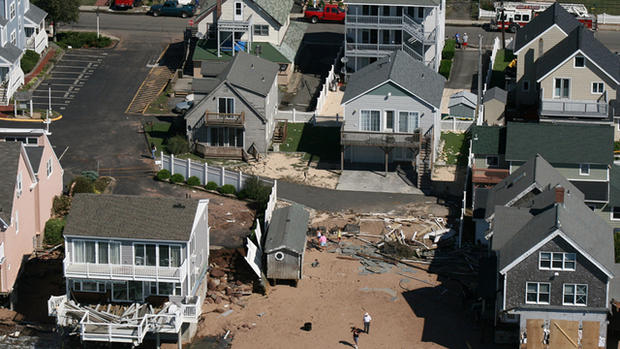Post-Irene damage: What is and isn't covered
Hurricane Irene, according to one new estimate, caused $3 billion to $6 billion in insured losses. But if your property is damaged, it can be very hard to figure out what insurance covers.
So on "The Early Show," CBS News Business and Economics Correspondent Rebecca Jarvis explained what is -- and isn't -- covered.
Complete coverage: Hurricane Irene
Wind damage, for instance, Jarvis said, is covered by a homeowner's policy.
She said, "Whether it's from a hurricane, in this case, or a tornado, as well, wind is covered. It covers your home, the contents of your home. So let's say you have furniture that was destroyed or damaged. It covers your garage and deck. And it also covers unattached structures in your yard. For example, if you have a shed. But the bottom line here is that it has to be wind damage. Flood damage, water damage, falls under an entirely different policy."
But, "Early Show" co-anchor Jeff Glor noted, what happens when winds blow the water onto your belongings?
Jarvis said, "This is the thing. This is the kind of argument that you're probably going to be having with your insurance provider at a time like this. Flood insurance is a much different scenario. It's not covered under your homeowner's policy. You have to get additional insurance through The National Flood Insurance Program, if you want to be covered in floods. Now, there is an out here: You can check with Fema.Gov. If you don't have flood insurance, the federal government may cover some of the damages. But you have to keep those damaged items, take photos of them, take photos around the house, so you have representations of exactly what happened. Don't throw them out."
If your car was affected by the hurricane, Jarvis said its location can have a lot to do with how it is covered by insurance.
She explained, "Let's say the car is parked out in the yard and it gets damaged. That will be covered under your comprehensive auto insurance. Now, if it's in the garage, and it's actually damaged inside your home, then you want to check the homeowner's policy."
Many homes have also been affected by downed trees. If a tree is yours, or someone else's, and location may affect how you are covered, as well, Jarvis said.
"Let's say the tree is in your yard, and it falls on your home. That would be covered by your homeowners insurance. Now, if it hits your neighbor's property, their homeowner's insurance should be covering it. And lastly, if the tree falls in the yard and doesn't hit the home, unfortunately you're not covered. Unfortunately, you're not covered by your homeowners insurance to have someone come and take it away."
Jarvis added, "There's a lot of minutia here."
But it's not all sour grapes for people affected by the hurricanes. Jarvis said if your food was spoiled when power was knocked out during the storm, you can receive compensation between $250 and $500 per appliance.
However, if your deductible is high to begin with, should you file a claim at all?
Jarvis said there's division on this issue, noting, "The tax industry, or rather the insurance industry says, 'Yes, you should file, because the damages may be more costly than you think.' So they may actually be above that deductible. On a consumer advocate's basis, sometimes they'll say don't necessarily file. You have to do the cost-benefit analysis, because when you do file, oftentimes your premiums are going to go up."
"So if you look around your house and say, 'I can see a couple of hundred dollars worth of damage here, but my premiums are probably going to go in the next couple of years way higher than that,' then you might want to take a step back and say, 'Maybe I won't file this go-around,'" she said. "But if you think that the damage may be more costly than your initial estimate, then you should file, because there is the chance that you will go over that deductible. And let's say there's another disaster a couple weeks or years from now, well, it all ends up amounting to a bigger deductible."
